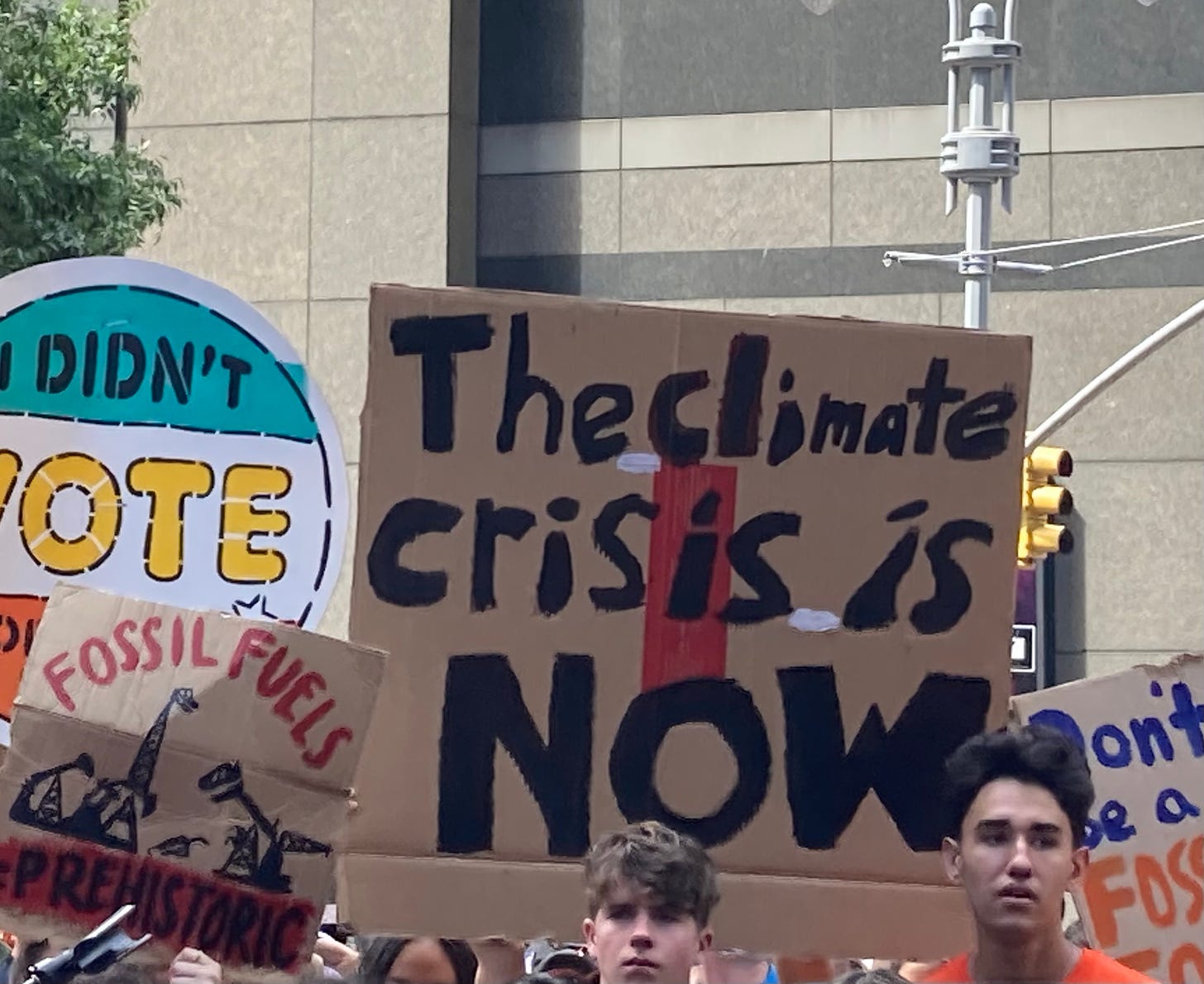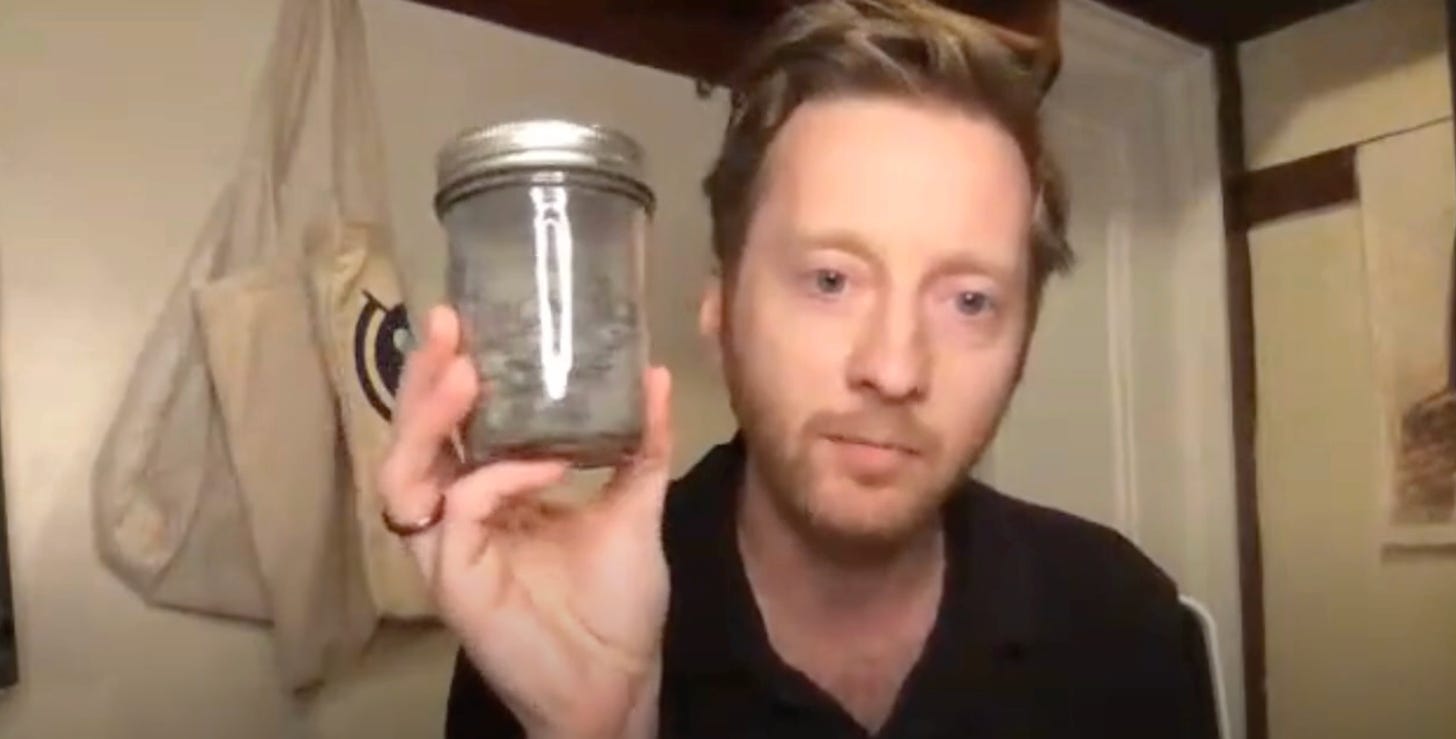Survivors of Climate Disasters and Extreme Weather Call for Accountability from Fossil Fuel Companies
From extreme heat to horrific fires, floods, and hurricanes, fossil fueled climate impacts are affecting people and communities across the US.
Deborah Parker, a retired nurse living in Tucson, Arizona, is used to the heat. She moved to Arizona as a new RN in 1982 and raised her family there, and she never used to worry too much about the outside temperatures. “Although it’s been hot back then, it’s so much worse now,” she said.
As one of the hottest cities in the US, Tucson regularly sees triple-digit temperatures during the summer – last summer set a record for the most days above 110°F – and these conditions can pose significant health risks and can even be lethal.
Extreme heat is one of impacts of the climate crisis that is caused by the accumulation of heat-trapping gases primarily emitted from fossil fuels. “Global boiling,” as the UN-Secretary General accurately described it, is not some mere abstract and distant projection as predicted by climate models and measured through degrees Celsius. It is present reality, manifesting on the ground through extreme weather events and slower onset trends such as deadly heat and wildfires and more intense drought, catastrophic storms and flooding, and coastal erosion and sea level rise.
“About 9 in 10 Americans say they’ve already been harmed by extreme weather,” Chris Kocher, co-founder and co-executive director of a new group called Extreme Weather Survivors, said during a recent press conference highlighting the stories of people who have endured climate-related disasters. “This is not just something that our kids will be dealing with in the next decade. This is something we are facing right now in communities around the country. And it’s not natural.”
Parker’s 18-year-old granddaughter Patrice, who also lives in Tucson, has multiple pre-existing health conditions that puts her at higher risk from excessive heat. “My fatigue and complete exhaustion, high heart rate, anxiety and depression are always worse when it’s summer because of the heat,” she said. “The hot air makes it hard for me to breathe with my asthma. Think of standing in front of an oven when you open the door and trying to take a deep breath. It hurts my lungs.”
The stifling heat means that Patrice and Deborah are often confined to the air-conditioned indoors, and when they do have to venture out, say to run errands, they have to take extra precautions. “I’m getting older and I walk extra carefully when I’m in parking lots, because if you fall the asphalt will burn your skin almost immediately,” Deborah said. She often can feel the heat from the parking lot through her shoes.
Displacement and Devastation from Fires, Floods, and Hurricanes
While Arizonans swelter through oven-like outside temperatures, in other parts of the country climate-fueled extreme weather has resulted in immense destruction and displacement of entire communities.
Allen Myers was born and raised in Paradise, California - a “little sleepy mountain town of 28,000 in the foothills of the Sierras,” as he described it. But in November of 2018, tragedy struck when a wildfire known as the Camp Fire destroyed the community as it blazed across more than 150,000 acres and resulted in 85 deaths – the deadliest wildfire in the state’s history.
“I lost my family’s home. Every home I ever played at as a kid. The school that I went to. The hospital that I was born at. All gone. There’s been an erasure of my identity and my community’s identity,” Myers said during the press conference. He then held up a jar of ashes. “This is what is left of my family’s home.”
Myers said that while the utility company PG&E may have provided the spark that ignited the blaze through its mismanaged electrical equipment, “the conditions were set long before by the fossil fuel industry.” He pointed to the unusually dry and windy conditions that enabled the fire to spread much more widely and rapidly, noting that the area hadn’t seen any measurable rainfall for over 200 days leading up to the November 8 disaster. The hot, dry, windy conditions, Myers said, “took that spark and turned it into the costliest disaster in the world for 2018.”
“I still have friends that are living in garages, temporary living situations, living out of their cars because they are unable to rebuild and have not found their feet,” he said.
On the US Gulf Coast, a different kind of extreme weather disaster has repeatedly devastated communities that are on the frontlines of both petrochemical industry expansion and climate vulnerability. Roishetta Ozane, a mother of six who lives in the town of Sulphur in southwest Louisiana, said this coastal area is threatened with rising sea levels and erosion and is particularly prone to hurricanes; these storms, scientists say, are intensified by high sea surface temperatures like the rapidly warming waters of the Gulf of Mexico.
“In 2020 in the midst of a global pandemic, we had two major hurricanes that hit in southwest Louisiana – Hurricane Laura and Hurricane Delta,” Ozane recalled. She said that she and her six children were displaced because of these hurricanes, and many others in her community were likewise rendered homeless by the storms that occurred just six weeks apart.
Ozane said she sees a direct link between the fossil fuel refineries and chemical plants in her neighborhood and the extreme weather disasters ravaging communities like hers. “When I walk out my backdoor, I can see over 14 petrochemical and other chemical polluting facilities,” she said. “The greenhouse gas emissions that are coming from these facilities are causing these climate-induced disasters. The climate-induced disasters are displacing people and families.”
Jenny Sebold, a single mother of three and a small business owner in Montpelier, Vermont, is still struggling to make end meet nearly a year after catastrophic flooding devastated Vermont’s capital city in July 2023. Streets in the downtown district, where the Winooski River flows through, were submerged as the river spilled over its banks due to excessive rainfall. Sebold’s small clothing shop filled up with water, and like many shops and businesses in town, she was forced to close for more than six months in order to clean up and repair and rebuild from the damage. “It was devastating,” Sebold said. “And I’m still rebuilding. It’s not stopped.” She said it feels unfair that the devastation and economic and emotional suffering and trauma is “all pushed onto the people.”
Human Toll That Was Foreseeable by Fossil Fuel Firms
The climate crisis is taking a human toll, inflicting pain and mounting costs and damages on everyday people and communities across the US and around the world. As these stories illustrate, the experiences and types of climate impacts may vary, but they should not be viewed as isolated incidents or disasters because they are all exacerbated by climate change, which again, is driven primarily by combustion of fossil fuels. This is the climate emergency, here and now.
The fossil fuel industry has long known that its products and its business model would steer us down this path of global climate change and that it could have “catastrophic consequences.” In a 1981 internal memo, for example, Exxon scientist Roger Cohen warned that “it is distinctly possible” that climate impacts “will indeed be catastrophic (at least for a substantial fraction of the earth’s population).” And a confidential 1988 report from Shell warns: “if this warming occurs then it could create significant changes in sea level, ocean currents, precipitation patterns, regional temperature and weather. These changes could be larger than any that have occurred over the last 12,000 years. Such relatively fast and dramatic changes would impact on the human environment, future living standards and food supplies, and could have major social, economic, and political consequences.” The report also acknowledges that Shell bears some responsibility for the CO2 emissions driving these changes, estimating the company’s products “account for the production of 4% of the CO2 emitted worldwide from combustion” – and that was back in the 1980s.
Calls for Accountability
During the recent climate survivors press conference, organized by Extreme Weather Survivors, Chesapeake Climate Action Network, and Public Citizen, people who have been personally impacted by extreme weather and climate disasters say that fossil fuel companies should be held accountable.
“The oil and gas companies need to be held accountable. They have made record profits polluting our world as they knowingly caused climate change. And we pay the price every day as we suffer through the heat,” said Deborah Parker.
Myers noted that PG&E, the utility company that sparked the horrific 2018 Camp Fire that destroyed his hometown of Paradise, has since pled guilty to 85 counts of manslaughter. “Now, I’m curious about the other actors. PG&E might have been the ones with the match, but it was the fossil fuel industry that threw fuel on the fire,” he said. “They are absolutely responsible in part for this disaster and should be held accountable.”
According to a 2023 peer-reviewed study from researchers with the Union of Concerned Scientists, more than a third of the total area burned from wildfires in the western US and southwestern Canada since 1986 can be linked to emissions from the 88 largest fossil fuel and cement companies. “Our study offers scientifically backed answers to questions of who bears the responsibility for this gut-wrenching destruction,” Kristina Dahl, principal climate scientist at the Union of Concerned Scientists, said in a press release accompanying that study.
“As we head now into another summer of lethal heat waves and wildfires and hurricanes and other climate-fueled catastrophes, we think it’s really important to remember every time a disaster strikes that we have solutions that can provide climate survivors with restitution and accountability from the actors responsible,” Aaron Regunberg, senior policy counsel with Public Citizen’s climate program, said during the press conference. Among those legal mechanisms for accountability are civil litigation, potential criminal prosecution, and polluter pays climate legislation like the kind recently enacted in Vermont.
Anne Watson, a Vermont state senator and one of the lead sponsors of Vermont’s groundbreaking “climate superfund” bill that holds major fossil fuel companies liable for climate costs, told me that last summer’s flooding disaster provided important impetus for this legislative action. “I think there was a significant amount of support for it from our constituencies across the state. And I think a lot of that had to do with the fact that Vermont experienced widespread devastating flooding just last summer.”
Myers said it can often feel like a David versus Goliath battle in dealing with climate-related devastation while fossil fuel majors rake in record profits and largely operate with impunity. “The reality is that [fossil fuel executives] are not going to feel the loss like we are,” he said. “They have billions of dollars that will always shield them from the devastating consequences of the climate crisis. It’s upon us who are feeling it every day to come together in a coalition and fight this. And that’s what we’re doing. From California to Vermont to Arizona to the Gulf, we are feeling the loss and it’s upon us to have our voices heard, to fight against this Goliath that has inflicted this loss upon us.”





